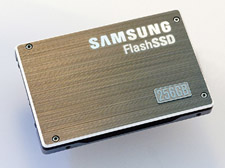Samsung ships 128GB SSDs with cheaper flash memory


Samsung has been shipping first-generation PC drives based on SLC, or single-level cell, NAND flash for some time. Dell and Alienware were the first OEMs to begin offering these 64GB drives in some laptops starting last September. But they've been slow to catch on, in part because they are so costly relative to conventional hard disk drives. That is why the shift to MLC is significant. MLC, or multi-level cell, NAND flash currently stores two bits of information in each cell, which effectively cuts the cost of the chips nearly in half. Samsung is shipping 1.8- and 2.5-inch drives in both capacities.
Samsung isn't the first to mass produce MLC-based SSDs. Toshiba announced in March that it was shipping 128GB SSDs using MLC NAND flash, initially for use in Toshiba-branded laptops. Earlier this month, OCZ announced a Core line of 32GB ($169), 64GB ($259), and 128GB ($479) SSDs built on Samsung's MLC flash chips. (Samsung hasn't announced pricing for its MLC-based drives yet.) And SanDisk and Intel have announced lower density SSDs with a PATA (parallel ATA) interface using both SLC and MLC flash and targeted at handhelds and ultra low-cost PCs.
The catch with MLC is that it has slower performance and a shorter lifespan (significantly fewer read/write cycles). There are techniques to compensate for this, but they require sophisticated controllers that are still in the early stages of development. Samsung said its latest drives can write data at 70MB per second and read data at 90MB per second, which is close to the performance of current SLC drives for PCs (SLC drives for enterprise storage applications from companies such as STEC are much faster). Samsung also claims its MLC-based SSDs will last about 20 times longer than the typical laptop.
While SSDs offer many theoretical advantages, it seems the honeymoon is over, not only because of the sky-high cost and lower density, but also because the first crop of drives have failed to live up to performance expectations. The enthusiast site Tom's Hardware recently caused a stir when it published test results showing laptop battery life with SSDs was actually shorter--not longer--than with a conventional 25-inch, 5,400rpmHDD. (The four SSDs it tested, however, were all early 32GB models with a SATA 1.5-gigabits-per-second interface that won't see any widespread adoption. Most newer PC drives--including Samsung's--use a SATA-II 3.0Gbps interface.) In an interview with ComputerWorld this week, a Fujitsu executive said SSDs and hybrid drives would remain a niche market for the next couple years. "Two years ago, a lot of our competitors were hyping these drives, Fujitsu elected not to release the product we developed in the laboratory after benchmarking it because there's no value proposition for this drive," said Joel Hagberg , Fujitsu's VP of business development.
Still Samsung remains bullish on SSDs. It expects SSD sales to grow 800% in the next couple of years and says the drives will be the flash industry's fastest growing segment. Gartner predicts unit sales will increase from 635,000 units last year to 33 million units in 2012, a compound growth rate of 117%. Even if the market grows at a slower pace, it's easy to see why SSDs are so critical given the density compared with other flash devices such as cards and USB drives. A single 128GB Samsung SSD consists of 64 16Gb NAND flash chips. And in an industry that cranks out 2.5 times more NAND flash every year, it's going to take more than a few million 16GB iPhones to use up all those bits.